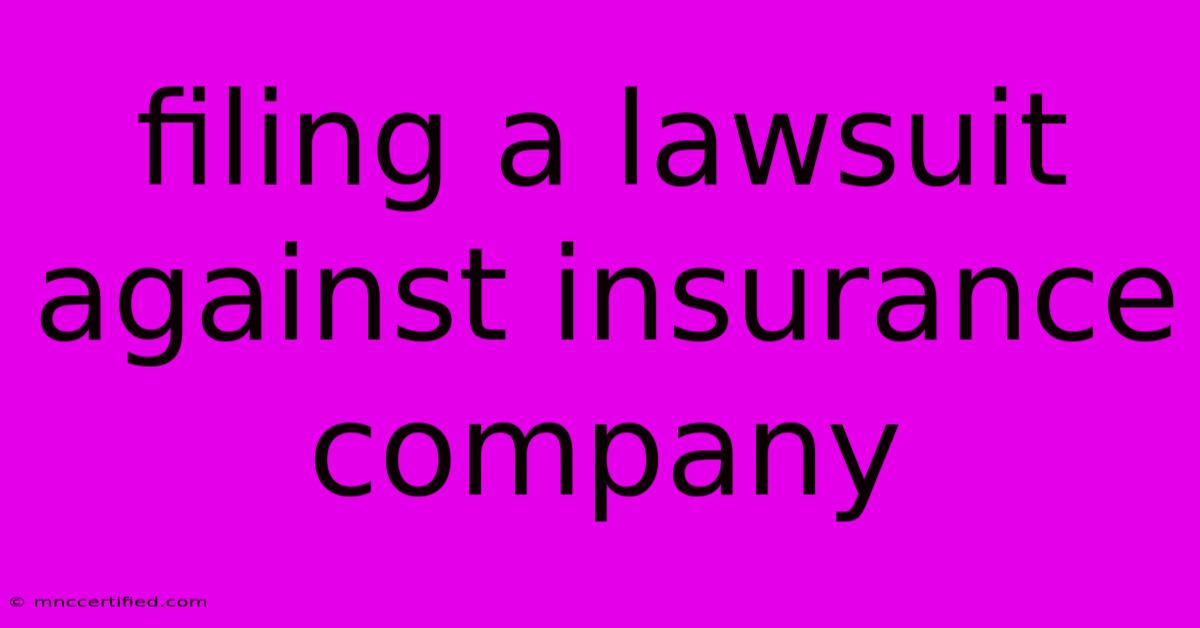Filing A Lawsuit Against Insurance Company

Table of Contents
Fighting Back: When to File a Lawsuit Against Your Insurance Company
Dealing with insurance companies can be frustrating, especially when they deny or underpay a claim. While many disputes can be resolved through negotiation, sometimes you might need to take more drastic measures. Filing a lawsuit against your insurance company is a serious step, but it may be necessary to protect your rights and secure the compensation you deserve.
When Should You Consider a Lawsuit?
Before taking legal action, it's crucial to understand the circumstances that justify filing a lawsuit. Here are some key indicators:
- Unfair Denial of Your Claim: If your insurance company denies your claim without a legitimate reason, or if they fail to provide sufficient evidence for their denial, legal action might be warranted.
- Unreasonable Underpayment: When your insurance company offers a settlement that significantly undervalues your losses, a lawsuit could help you receive fair compensation.
- Bad Faith Practices: Insurance companies have a duty to act in good faith. If they engage in deceptive tactics, delay tactics, or other unethical practices, a lawsuit may be necessary to hold them accountable.
- Breach of Contract: If your insurance company fails to uphold the terms of your policy, leading to a financial hardship, you have grounds for a lawsuit.
The Process of Filing a Lawsuit
- Gather Evidence: Before initiating a lawsuit, compile all relevant documentation, including your policy, claim forms, correspondence with the insurance company, medical records, repair estimates, and any other evidence supporting your claim.
- Consult with an Attorney: A qualified attorney specializing in insurance law can assess your case, guide you through the legal process, and provide expert advice.
- File the Complaint: Your attorney will prepare and file a complaint in the appropriate court, outlining your legal arguments and seeking specific remedies, such as financial compensation or policy modifications.
- Discovery Phase: This phase involves exchanging information and evidence with the insurance company, potentially including depositions and interrogatories.
- Negotiation and Settlement: While not guaranteed, both parties may attempt to resolve the dispute through negotiation and reach a settlement outside of court.
- Trial: If a settlement cannot be reached, the case will proceed to trial, where a judge or jury will decide the outcome based on the evidence presented.
What to Expect in a Lawsuit
- Time and Cost: Legal proceedings can be lengthy and expensive. Be prepared for significant time investment and legal fees.
- Emotional Strain: Filing a lawsuit can be emotionally draining, particularly if you are already struggling with the consequences of your insurance claim denial.
- Risk of Appeal: Even if you win your case, the insurance company may appeal the decision.
- Public Record: The lawsuit will become a public record, potentially affecting your future insurance coverage.
Alternatives to Filing a Lawsuit
- Mediation: A neutral third party helps facilitate communication and potential settlement agreements.
- Arbitration: A neutral party hears both sides of the dispute and makes a binding decision.
- State Insurance Department Complaint: You can file a complaint with your state insurance department, which may investigate the matter and attempt to resolve the dispute.
Important Note: It's essential to remember that every case is unique. Consulting with an experienced attorney is the best way to determine your legal options and proceed with the most effective strategy for your specific situation.

Thank you for visiting our website wich cover about Filing A Lawsuit Against Insurance Company. We hope the information provided has been useful to you. Feel free to contact us if you have any questions or need further assistance. See you next time and dont miss to bookmark.
Featured Posts
-
Ethereum Investment Return 1000 In 2018
Nov 07, 2024
-
Is Pennsylvania A No Fault Insurance State
Nov 07, 2024
-
Vances Ruthlessness From Mockery To Power
Nov 07, 2024
-
Manatee Insurance Exchange Reviews Florida
Nov 07, 2024
-
Live Stream Barcelona Vs Red Star Belgrade November 6 2024
Nov 07, 2024